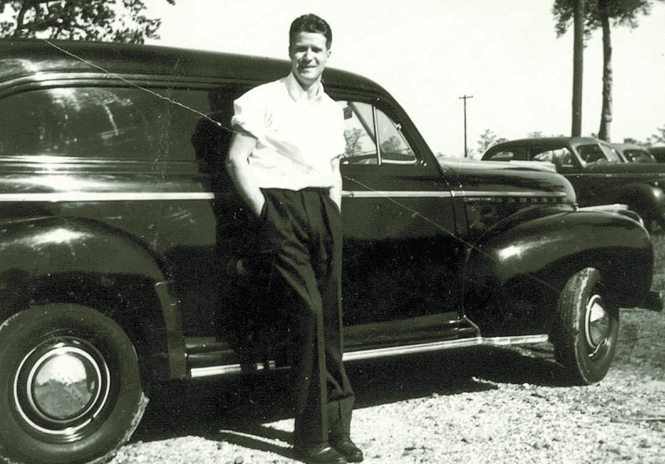By William Sweet
The last publisher of Look magazine recalls his early days selling VapoRub door-to-door in the rural South[Sales] When a Mississippi farmhand dipped a finger into the jar of Vicks VapoRub and proceeded to eat half of the contents, a young Tom Shepard ’40 knew he was learning more than just how to sell salve.
“I was dazzled. It was unbelievable,” Shepard says of the incident he describes in his new book, Making the Sale: The Art of Salesmanship. Much of the book is about his days as a salesman for the Vick Chemical Co. in the rural South on the cusp of World War II.
Shepard would go on to serve in the U.S. Navy during the war and, later, to become an advertising salesman and eventually publisher of Look magazine. But he says his earliest work experiences, as documented in the book and in the traveling salesman’s letters home, gave him his biggest education after Amherst. Now 96, he says that time still resonates for him.

Fresh out of Amherst, the New Jersey native opted for a competitive training program offered by Vick. Starting in Paintsville, Ky., Shepard apprenticed with a veteran salesman who drove in an unmarked truck so they could secretly sell to grocery stores that competed with local pharmacies. Ad placement came in the form of a metal sign they’d ask to hang in a pharmacy; to ensure the sign would not come down soon, they’d screw it into the wall and strip the screw heads. A sales pitch might include tipping back a surprised customer’s head and squirting his nostril with a dose of Va-Tro-Nol.
“I had never been south of Philadelphia,” Shepard says, and he was appalled by the poverty he saw in the South, especially among the African-American population. Sometimes, Vicks was the only medicine people had. The South was a harsh market for a salesman: miles upon miles of travel on dirt roads into tiny communities still reeling from the Great Depression, with just a little sleep between trips.
“The Vick experience was a growing-up experience, immediately. It was just tough as hell,” he says. “But I knew I had to win, because I wanted to marry the girl, and I wanted a job.”
He did marry the girl (the former Nancy Kruidenier, whom he courted during her days at Smith College, and to whom he remains devoted), and he rose through the ranks at Look until it folded in 1971.
He cast the memoir of his business years as a how-to. It looks back over 70 years and millions of dollars in sales, and it includes advice for today’s new graduates. “It’s built around the idea of how you sell a product, but the product can also be yourself,” he says. He concludes with some simple rules: Know your audience. Know your product. Treat your product with pride and your employees with respect.
As he was involved in sales and advertising in the 1960s, the question must be asked: Has he seen Mad Men? The answer is yes, and he says the program is mostly accurate in its portrayal of that period, to a point.
“I mean, they had to make a show of it,” he says. “We weren’t that raunchy, and we drank, but we didn’t drink that bad. And we went home to our wives, essentially.”
William Sweet is a writer in Amherst’s Office of Communications.